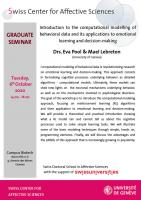
GRADUATE SEMINAR - Introduction to the computational modelling of behavioral data and its applications to emotional learning and decision-making
06.10.2020 14:00 – 18:00
Computational modeling of behavioral data is revolutionizing research on emotional learning and decision-making. This approach consists in formalizing cognitive processes underlying behavior as detailed algorithms - computational models. Ultimately, these models can shed new lights on the neuronal mechanisms underlying behavior, as well as on the mechanisms involved in psychological disorders.
The goal of this workshop is to introduce the computational modeling approach, focusing on reinforcement learning (RL) algorithms and their application to emotional learning and decision-making.
We will provide a theoretical and practical introduction showing what a RL model can and cannot tell us about the cognitive processes used to solve simple learning tasks. We will illustrate some of the basic modeling techniques through simple, hands on, programming exercises. Finally, we will discuss the advantages and the pitfalls of this approach that is increasingly growing in popularity.
Schedule
14h00-15h00: General introduction to reinforcement learning models
15h00-15h30: Practical part in groups
15h30-14h00: Break
14h30-15h00: From reinforcement learning to behavior
15h00-15h30: Practical part in groups
15h30-16h00: Break
16h30-17h00: Estimating model parameters
17h00-17h30: Programming Demo
17h30-18h00: Discussion on why and how of modeling approach
MANDATORY REGISTRATION: https://formulaire.unige.ch/cisa/survey/index.php/995324?lang=en
Requirements:
Laptop with Matlab or Octave installed
Optional readings materials (as follow-up):
Daw, N.D. (2011). Trial-by-trial data analysis using computational models. Decis. Mak. Affect Learn. Atten. Perform. XXIII 23, 3–38.
O’Doherty, J. P., Hampton, A., & Kim, H. (2007). Model‐based fMRI and its application to reward learning and decision-making. Annals of the New York Academy of sciences, 1104(1), 35-53.
Palminteri, S., Wyart, V., & Koechlin, E. (2017). The importance of falsification in computational cognitive modeling. Trends in cognitive sciences, 21(6), 425-433.
Wilson, R. C., & Collins, A. G. (2019). Ten simple rules for the computational modeling of behavioral data. Elife, 8, e49547.
Optional online tutorial (as follow-up)
http://hannekedenouden.ruhosting.nl/RLtutorial/html/ModellingRecipe.html
Lieu
Bâtiment: Campus Biotech
H8.01 D
Organisé par
Centre interfacultaire en sciences affectives (CISA)Intervenant-e-s
Eva Pool, University of GenevaMael Lebreton, University of Geneva
entrée libre
Plus d'infos
Contact: missing email
Fichiers joints
| Graduate_seminar___Eva_Pool___Mael_Lebreton.pdf | 526.2 Kb |

 haut
haut